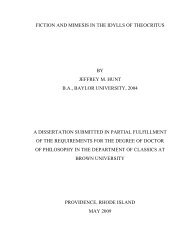View PDF - Brown University Library
View PDF - Brown University Library
View PDF - Brown University Library
- No tags were found...
You also want an ePaper? Increase the reach of your titles
YUMPU automatically turns print PDFs into web optimized ePapers that Google loves.
130 The Financial Situationthe removal, "so far as possible," of economicbarriers was placed necessarily inthe hands of the League of Nations. Ontop of all, the Allies, in advance of thesigning of the armistice, had expressly laiddown as an ultimatum an indemnity forcomplete restitution and reparation forthe unlawful German depredations.LARGELY because of knowledge of' these facts, partly because of knowledgeof the German temperament, the attitudeof the financial community did notchange.Scope ofthe StockExchangeMovementDuring all the time in whichGermany's action was hangingin the balance, the extraordinarymovement on theAmerican Stock Exchange didnot slacken. The advance inprices up to the end of May carried theactive industrial shares to a level twentyor thirty points, in some cases sixty orseventy, above the low prices of the year,reached during January or February.Even railway shares, notwithstanding thefact that net earnings, owing to highercost of labor, were $250,000,000 less inthe first four months of 1919 than theamount guaranteed by the governmenton the basis of pre-war earnings for asimilar period, and notwithstanding uncertaintyas to conditions under which therailways would be returned to privateoperation, had moved up ten to fifteenpoints.In actual transactions on the StockExchange, the market reached a scale ofmagnitude only two or three timesequalled in the history of Wall Street.During April only seven full businessdays failed to exceed the traditional"million-share" mark of abnormal activity.During May there was no exception;twice the record closely approached twomillion shares, which it passed in June.Total transactions for the month of Maywere the third largest of any month in theStock Exchange's history. When it isobserved that the average number ofshares which changed hands in the samemonth of the past ten years was thirteenmillion shares, and that thirty-four millionwere sold on the floor of the Exchangein May of 1919, no one will wonder thatclerks of commission houses had to taketurns working overtime in relays, nightsand Sundays, merely to keep the booksof the firms posted to date.THERE are several considerationswhich have to be kept in mind, inorder properly to understand this extraordinarymovement. One of them isthat even the unusually prolonged andviolent advance of April andMay did not carry prices on StockMarket,the Stock Exchange as highNow andas those which were reached in 1916in war-time, but before ourcountry joined the conflict. There wereexceptions to this statement; but thestocks which went this spring above theirtop prices of 1916 were few in number,and subject to special influences. Sharesof the great United States Steel Corporation,on which much of the speculativeactivity converged, did not get this Maywithin twenty points of the high price ofNovember, 1916. Even after the rise ofApril and May a very great number ofthe active shares, notably those of therailways, were left well below the pricestouched in 1913 and 1912.In other words, the advance in pricesmight be considered as recovery reflectingprevious mistaken views of the situation,quite as reasonably as it might be consideredan advance from one high levelto another. This view of the matter isnot unimportant. It has at least somebearing on the reiterated argument thatwhat Wall Street has been witnessing isan "inflation market" pure and simple.If by "inflation market" people merelymean expansion in the volume of businessdone and in average values, as comparedwith some other selected date, then noone will dispute the fact; but it would beto beg the question. If it is meant thatcredit, as embodied in the country's bankloans, has been expanded to a very unusualdegree, then that assertion alsodeals with admitted facts. But if, on theother hand, the usual and traditionalmeaning is attached to the term "inflationmarkets"—namely, that prices of(Continued on page 58, following)Stock Exchange securities as well asprices of commodities have been advancedbecause of inflated or depreciated currencies—thenthe matter calls for closer examination.Our Federal Reserve notecurrency had increased something like










